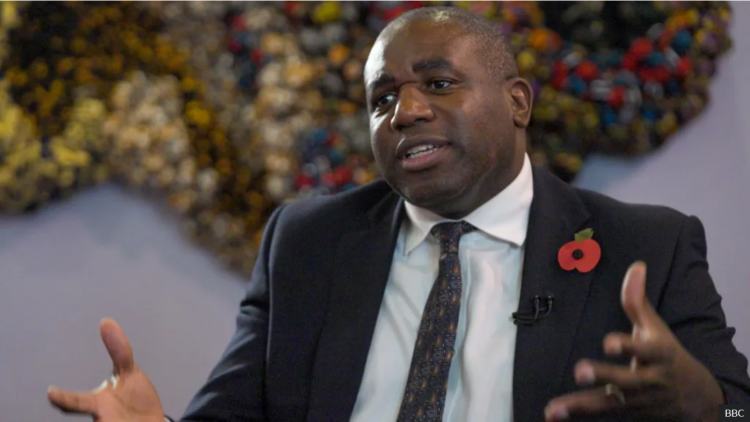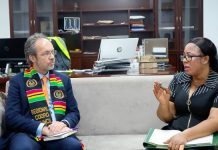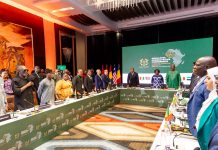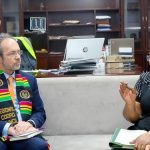UK Foreign Secretary David Lammy stated that the idea of reparations for former colonial nations impacted by slavery “is not about the transfer of cash.”
In his first remarks since 56 Commonwealth leaders signed a statement advocating for discussions on reparations, Lammy clarified to the BBC that financial compensation is not the main focus of the conversation people seek.

The UK government has previously dismissed the notion of paying reparations for slavery, maintaining that its stance encompasses “other forms of non-financial reparatory justice” as well.
Instead, Lammy emphasized the importance of strengthening ties with African nations through skill and scientific exchange, especially during his first visit to Africa in his role as foreign secretary.
He remarked that discussions on reparations should not center on monetary compensation, particularly amid a cost-of-living crisis.
Reparations typically refer to measures taken to rectify past injustices, with cash payments being the most recognized form.
However, reparations can also include official apologies or investments in health and education.
While addressing the history of the transatlantic slave trade in Lagos, Nigeria, Lammy acknowledged the “horrific and horrendous” nature of that period and its lasting impacts.
He personally identifies as a descendant of enslaved individuals and understands the deep scars left by that history.
The UK government and monarchy were integral to the slave trade from the 1500s, with historians estimating that over three million enslaved Africans were transported aboard British ships.
Nonetheless, Britain also played a pivotal role in abolishing the trade, with Parliament passing a law in 1833 to end slavery.
Lammy noted the significance of past apologies and commemorations of the abolition of the slave trade during the last Labour government.
While the UK has yet to issue a formal apology for its role in the slave trade, former Labour Prime Minister Tony Blair expressed remorse in 2007, stating, “We are sorry. And I say it again now.”
His comments came in the wake of discussions on reparations at the Commonwealth leaders’ summit in Samoa in October, where calls for reparations grew.
However, Downing Street insisted that the issue would not be on the agenda, though Sir Keir Starmer later supported a document advocating for conversations on “reparatory justice.”
Lammy acknowledged that Caribbean nations had presented a 10-point reparatory justice plan but expressed his belief that developing nations could benefit from initiatives involving the transfer of technical skills and scientific expertise from the UK.
During this trip, which includes visits to Nigeria and South Africa, Lammy emphasized the need for “a new approach to Africa” and plans to launch a five-month consultation period with African nations.
He noted that the UK’s focus had shifted from development to partnerships with African countries in recent years.
Addressing other pressing matters related to Africa, Lammy highlighted the “tremendous concern” over the ongoing conflict in Sudan, stating that he would prioritize this issue in November during the UK’s rotational presidency of the United Nations Security Council.
He expressed alarm over the extensive loss of life and aimed to raise awareness about the humanitarian situation and pursue a peaceful resolution, acknowledging the global implications of the conflict.
























































![[FREE FREE MONEY] Predict and Win a Guaranteed GH¢200 From Us EVERY WEEK](https://wordpress.ghanatalksradio.com/wp-content/uploads/2022/02/Predict-and-Win-Final-09-03-2021-218x150.jpg)
![[Predict & Win – 8th/Oct.] WIN A Guaranteed ¢200 From Us This Week](https://wordpress.ghanatalksradio.com/wp-content/uploads/2021/10/maxresdefault-16-218x150.jpg)
![[Predict & Win – 2nd] WIN A Guaranteed ¢200 From Us This Week](https://wordpress.ghanatalksradio.com/wp-content/uploads/2021/09/maxresdefault-50-218x150.jpg)
![[Predict & Win – 25th] WIN A Guaranteed ¢200 From Us This Week](https://wordpress.ghanatalksradio.com/wp-content/uploads/2021/09/maxresdefault-36-218x150.jpg)
![[Predict & Win – 18th] WIN A Guaranteed ¢200 From Us This Week](https://wordpress.ghanatalksradio.com/wp-content/uploads/2021/09/maxresdefault-23-218x150.jpg)








![[National cathedral] See full list of churches that have contributed since 2018](https://wordpress.ghanatalksradio.com/wp-content/uploads/2020/09/Ghana-National-Cathedral-GhanaTalksRadio-100x70.jpg)



